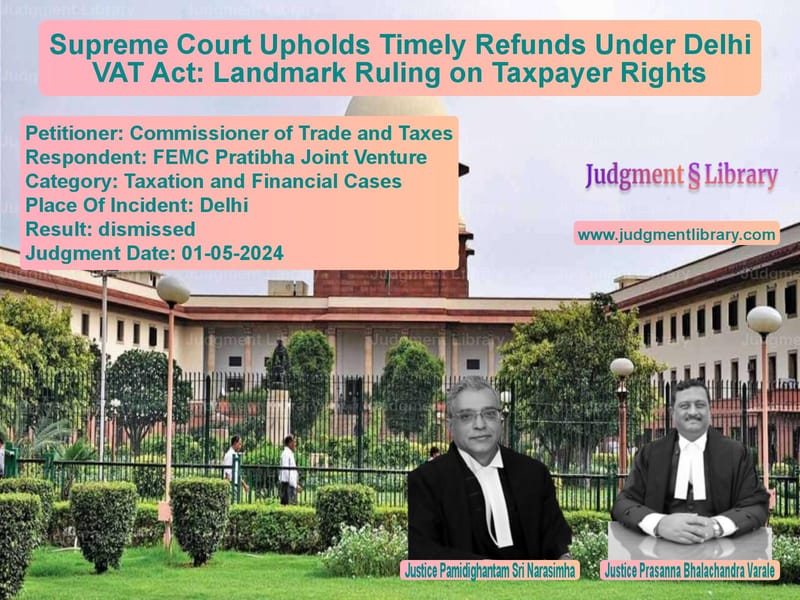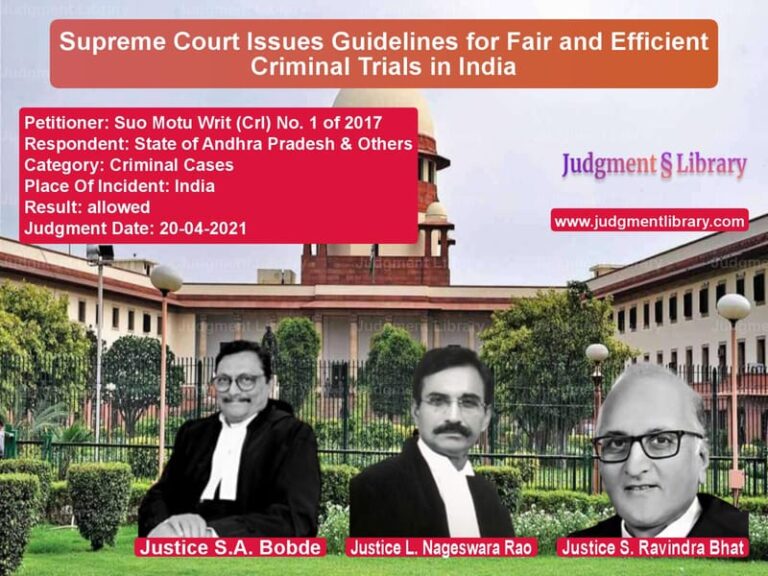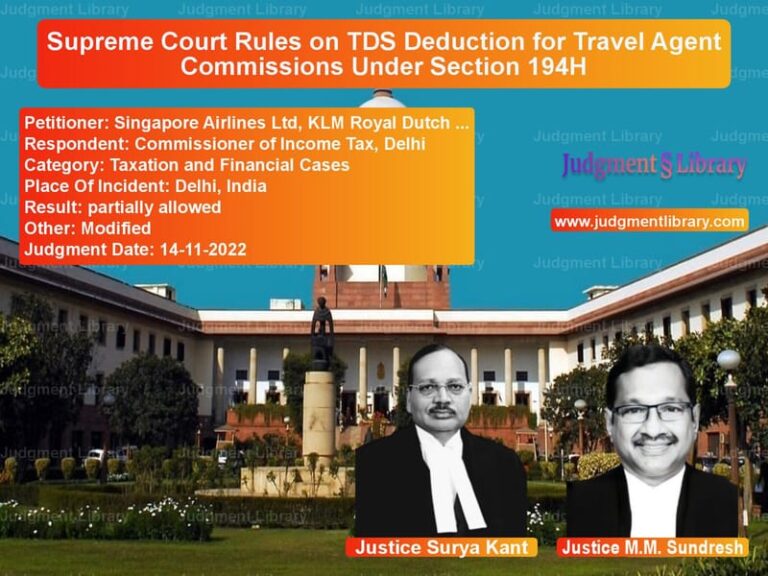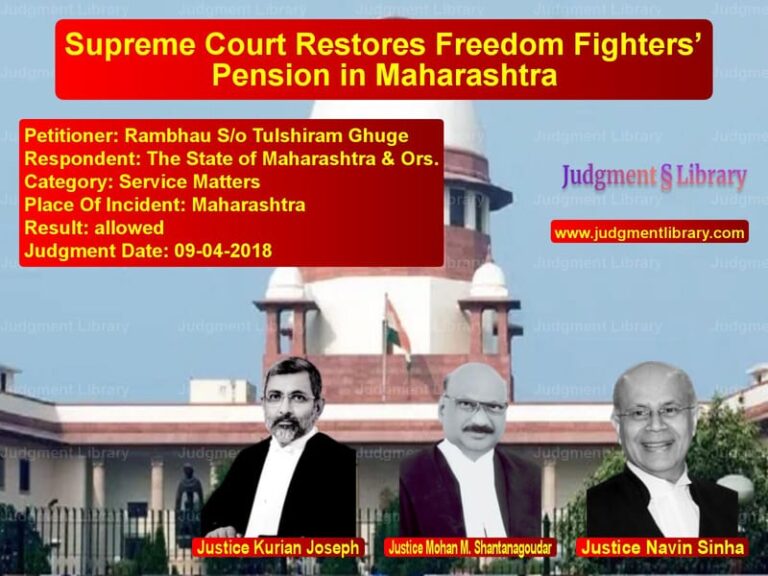Supreme Court Upholds Timely Refunds Under Delhi VAT Act: Landmark Ruling on Taxpayer Rights
The case of Commissioner of Trade and Taxes vs. FEMC Pratibha Joint Venture is a landmark judgment in which the Supreme Court of India ruled in favor of taxpayers seeking timely refunds under the Delhi Value Added Tax Act, 2004 (DVAT Act). The Court upheld the mandatory timeline for processing refunds, affirming that the tax department cannot delay refunds indefinitely or adjust them against future tax dues that were not crystallized at the time of the refund request.
Background of the Case
The case arose when FEMC Pratibha Joint Venture, a construction contractor for the Delhi Metro Rail Corporation, filed for a tax refund under the DVAT Act for two quarters:
- 4th Quarter of 2015-16: Refund claim of Rs. 17,10,15,285/- was filed on 31.03.2017.
- 1st Quarter of 2017-18: Refund claim of Rs. 5,44,39,148/- was filed on 29.03.2019.
The Delhi VAT department did not process the refunds within the statutory timeline and, in 2022, adjusted the refund amounts against tax dues arising from default notices issued between 2020 and 2022. FEMC Pratibha challenged this decision before the Delhi High Court.
Read also: https://judgmentlibrary.com/labelling-as-manufacture-supreme-court-rules-on-central-excise-dispute/
High Court’s Decision
The Delhi High Court ruled in favor of FEMC Pratibha, holding that the VAT department was bound by the statutory timelines for refund processing under Section 38 of the DVAT Act. The court directed the tax authorities to issue the refund along with interest under Section 42 of the Act.
Legal Issues Considered
The Supreme Court examined the following key legal questions:
- Is the timeline for refunds under Section 38(3) of the DVAT Act mandatory?
- Can a tax refund be adjusted against future tax dues that were not pending at the time of the refund request?
- Does the tax department have unlimited discretion in withholding refunds?
Arguments by the Appellant (Commissioner of Trade and Taxes)
The Delhi VAT department argued that:
- The timeline under Section 38(3) is meant only for calculating interest on delayed refunds and is not a strict deadline.
- Since the company had outstanding tax dues when the refund was processed in 2022, the department was justified in adjusting the refund against those dues.
- The Delhi High Court erred in holding that the refund process must be completed within two months.
Arguments by the Respondent (FEMC Pratibha Joint Venture)
The taxpayer contended that:
- Section 38(3) of the DVAT Act clearly mandates that refunds must be processed within one or two months, depending on the tax period.
- The tax dues against which the refund was adjusted arose after the refund period and were not crystallized when the refund claims were filed.
- Delaying refunds and unilaterally adjusting them against future dues is illegal and violates taxpayer rights.
Supreme Court’s Judgment
The Supreme Court upheld the High Court’s decision, ruling that the tax department must strictly adhere to the refund timeline. The key observations of the Court included:
“The language of Section 38(3) is mandatory and the department must adhere to the timeline stipulated therein to fulfill the object of the provision, which is to ensure that refunds are processed and issued in a timely manner.”
The Court further held:
- The refund should have been processed within two months of filing, i.e., by 31.05.2017 for the first claim and 29.05.2019 for the second claim.
- The department cannot adjust refunds against tax dues that were not pending at the time of the refund claim.
- The tax department’s contention that Section 38(3) merely provides for interest calculation was rejected as it would defeat the purpose of timely refunds.
- The taxpayer was entitled to a refund with interest under Section 42 of the DVAT Act.
Impact of the Judgment
The Supreme Court’s ruling has significant implications for tax administration in India:
- Stricter Refund Timelines: Tax departments across India must adhere to statutory deadlines for processing refunds.
- Protection Against Unilateral Adjustments: Tax refunds cannot be arbitrarily adjusted against future tax dues that were not pending when the refund claim was filed.
- Stronger Judicial Oversight: The ruling reinforces that courts will scrutinize tax department actions to prevent undue hardship to taxpayers.
- Enhanced Business Confidence: The decision ensures a fair tax system, encouraging businesses to comply with tax laws.
Conclusion
The Supreme Court’s decision in Commissioner of Trade and Taxes vs. FEMC Pratibha Joint Venture is a landmark ruling that upholds taxpayer rights against arbitrary delays in tax refunds. By enforcing strict compliance with statutory timelines, the judgment ensures that businesses do not suffer financial losses due to administrative inefficiencies. The ruling sets a precedent for future tax refund disputes, reinforcing the principle that tax authorities must operate within the limits of the law.
Petitioner Name: Commissioner of Trade and Taxes.Respondent Name: FEMC Pratibha Joint Venture.Judgment By: Justice Pamidighantam Sri Narasimha, Justice Prasanna Bhalachandra Varale.Place Of Incident: Delhi.Judgment Date: 01-05-2024.
Don’t miss out on the full details! Download the complete judgment in PDF format below and gain valuable insights instantly!
Download Judgment: commissioner-of-trad-vs-femc-pratibha-joint-supreme-court-of-india-judgment-dated-01-05-2024.pdf
Directly Download Judgment: Directly download this Judgment
See all petitions in Tax Refund Disputes
See all petitions in Judgment by P.S. Narasimha
See all petitions in Judgment by Prasanna Bhalachandra Varale
See all petitions in dismissed
See all petitions in supreme court of India judgments May 2024
See all petitions in 2024 judgments
See all posts in Taxation and Financial Cases Category
See all allowed petitions in Taxation and Financial Cases Category
See all Dismissed petitions in Taxation and Financial Cases Category
See all partially allowed petitions in Taxation and Financial Cases Category







